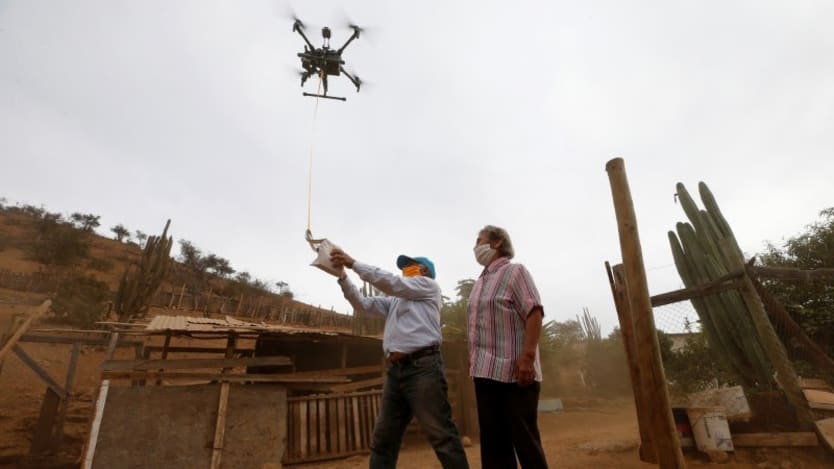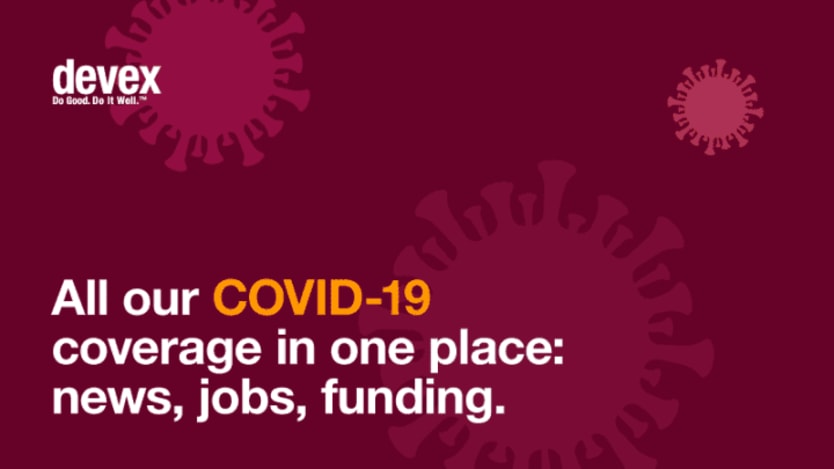
NAIROBI — As the COVID-19 pandemic tightens its grip on more countries around the world, tech solutions that help to deliver services remotely have become integrated into the response.
Globally, governments have taken measures to restrict movement of people — closing borders and implementing curfews and lockdowns — in response to the pandemic. While these measures can slow down the spread of the virus, they can also hinder the public health response to COVID-19 and harm economies.
Special report: Drones for Development
Drones are gaining ground in the aid sector for their potential to spur development outcomes. Yet, alongside excitement and enthusiasm is well-earned skepticism about the future of this new technology. (For Pro subscribers)
Companies and organizations are using drones, video chat, and mobile apps, among other tech solutions, to try to mount the difficult challenges surrounding these physical barriers. While they were originally aimed at improving efficiencies and reaching hard-to-access areas, their use has become more widespread and mainstream, including expansion into urban areas and into new services.
Drones delivering medical supplies
The company Zipline uses autonomous drones to deliver medical products across countries. Currently operating in Rwanda and Ghana, it is planning to launch emergency operations in the U.S. in the next few weeks. It also expects to operate in India within the next year.
COVID-19 — a timeline of the coronavirus outbreak
Follow the latest developments on the new coronavirus that causes COVID-19.
Health workers place orders by text message and a drone takes off from one of Zipline’s distribution centers. The drones can carry about 4 pounds of cargo, fly at up to 90 miles per hour, and reach their destination in an average of 30 minutes, according to the company.
The Ebola outbreak in West Africa was among the sources of inspiration for creating the Zipline solution, as communities were cut off from access to supply lines, said Brittany Hume Charm, head of global health at Zipline.
Now, Zipline drones fly COVID-19 test samples from patients in difficult-to-reach rural areas of Ghana to laboratories in Accra, the capital city, and Kumasi, the second-largest city.
“This marks the first time in history that autonomous drones have been used to make regular long-range deliveries into densely populated urban areas,” according to a press release.
Without the use of drones, such deliveries could take several days. A truck might have to wait for enough samples to justify the long journey to the city, whereas a drone can carry a single test. Delays can hamper a country’s ability to get ahead of the virus’s transmission and could jeopardize the samples, which might be damaged in transit if cold-chain links are broken, according to the company.
Beyond speed, the drones help to minimize the spread of the virus between truck drivers and communities, Hume Charm said. Drones can also help allocate limited supplies to the right locations, ensuring that they aren’t sitting unused in places that don’t need them. This could include personal protective equipment and COVID-19 test kits, Hume Charm said, adding that the same could apply to treatments and vaccines, which may have limited availability when they are found.
“For a health care worker in a small district to hear from another health worker in a similar small district about how they solved a problem makes a huge difference.”
— Bruce Baird Struminger, senior associate director, ECHO Institute“It’s very hard to be able to exactly match the supply to demand. By being able to allocate resources in real time on demand, you can make it so that you know that you are allocating a very scarce quantity of important products in the most efficient way possible,” she said.
There are also questions around maintaining continuity of care during the pandemic for people with preexisting conditions who need ongoing treatment, Hume Charm said. In Rwanda, for example, Zipline — with Partners in Health — is delivering chemotherapy medications to cancer patients who are unable to visit the hospital due to the health crisis, according to the company.
Video conferences linking health workers
Project ECHO works to provide “telementoring” services to health workers, who use a video platform to connect with subject matter experts to share best practices, creating peer-to-peer learning networks, according to Bruce Baird Struminger, senior associate director at the ECHO Institute. It connects front-line health workers, often in remote areas, with national or international level experts.
The strength of the system is that actual cases are presented and discussed, Baird Struminger said.
“For a health care worker in a small district to hear from another health worker in a similar small district about how they solved a problem makes a huge difference,” he said.
This helps people in rural areas give tips on best practices for how they are managing with limited resources, Baird Struminger said. This could include ways to preserve protective equipment, training on community surveillance, or providing information on oxygen therapy techniques.
“People — in their experience in places where they are treating lots of patients — are discovering best practices that need to be shared immediately across the globe,” he said.
Because COVID-19 is a new disease and the global health community is still learning about it, there is a constant need to update health workers, Baird Struminger said.
“There's a need to get expertise that might be circulating at a global level and transfer that rapidly to people that might be at a rural, remote health station,” he added.
Many countries where Project ECHO is already working, such as in Namibia, Zambia, Kenya, and Côte d'Ivoire, have added COVID-19 programming to their existing programs. For example, Côte d'Ivoire has run an HIV program through Project ECHO for about three years, working with about 50 hospitals. Now, those facilities are connecting to hundreds of other hospitals through the platform, working to coordinate the nation’s COVID-19 response.
Project ECHO already has existing partnerships with the Africa Centres for Disease Control and Prevention and the African Society for Laboratory Medicine. In response to the pandemic, the World Health Organization is hosting training sessions through Project ECHO. WHO typically trains health professionals in person or puts learning materials on its website, Baird Struminger said.
“I think it's fair to say this is bringing WHO into the world of live, interactive learning and sharing on best practices,” he said.
“There's a need to get expertise that might be circulating at a global level and transfer that rapidly to people that might be at a rural, remote health station.”
— Bruce Baird Struminger, senior associate director, ECHO InstituteMobile apps providing training
Medic Mobile, a nonprofit that provides open-source software to community health workers and health systems, is also remotely training health workers, often in rural areas, on how to respond to COVID-19 with national health protocols and global best practices and is supporting them with digital tools.
Among them is a toolkit of mobile apps that teaches health workers how to prevent the spread of the disease, how to spot it, and when to raise the alert level over a potential case and begin contact tracing — and enables them to do these activities digitally. It also includes mobile apps and workflows that provide health workers with tips on how to keep safe, as well as tools that provide mental health support.
Medic Mobile is working in some of the countries in Africa and Asia that it operates in to remotely onboard health workers to COVID-19 response efforts within their health programs and teach them how to use this technology — trainings that used to happen in person.
“As countries are in lockdown and in-person trainings are no longer an option, we need to make sure that technology is able to support their continued learning,” said Shreya Bhatt, director of partnerships at Medic Mobile.
Keeping development programs afloat
Amid the chaos, there is also a need to continue development programs, which can help to lessen the economic impact of the pandemic.
Noa Ubongo is a free learning channel from TBWA\Khanga Rue, a communications agency based in Dar es Salaam, Tanzania. The channel, whose name means “sharpen your brain” in Swahili, offers customized videos that provide Tanzanian youth with training on entrepreneurial skills, such as putting together a business plan and networking. It recently partnered with the U.S. Agency for International Development’s Feed the Future Tanzania Advancing Youth initiative to create a new course called Agriculture as a Business, which consists of more than 25 classes. This online component of the initiative means that USAID can continue its programming amid the pandemic.
“It's become crucial as a means to provide mentorship and skills building for the USAID program, as so much of their on-the-ground activities have been curbed by the virus,” said Pat Olvera, creative director of TBWA\Khanga Rue.
Due to the pandemic, Noa Ubongo is accelerating some of its programming. It is offering a podcast that will be distributed through Viamo and a Whatsapp for Business distribution network allowing youths to get the training videos sent to their phones.
It has also recently seen a spike in users, and other organizations have reached out to Noa Ubongo to expand its programming to different countries with translations and other localized content.
“They are facing the same challenges — meaning a lot of them were doing entrepreneurship and capacity building in the old-school ways of setting up classrooms and workshops — and now they can’t,” Olvera said.
“We’ve been constantly looking at ways to expand our reach. Now, it’s gone from ‘how do we expand our reach?’ to ‘it’s become mission critical that we continue to operate.’”
Visit our dedicated COVID-19 page for news, job opportunities, and funding insights.

